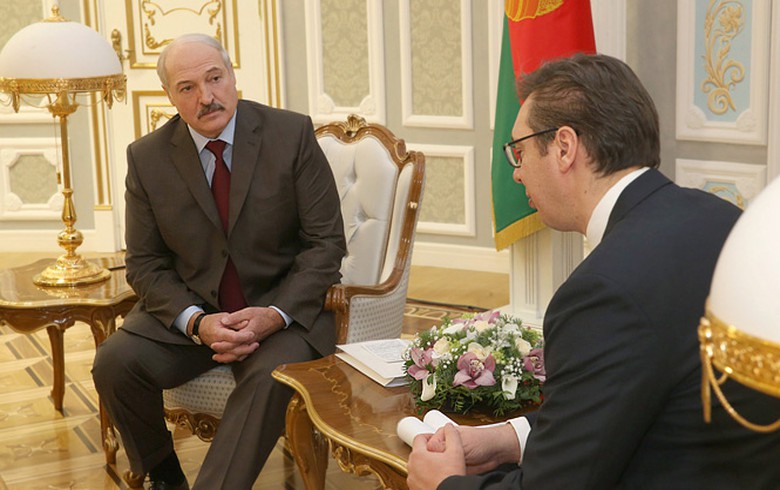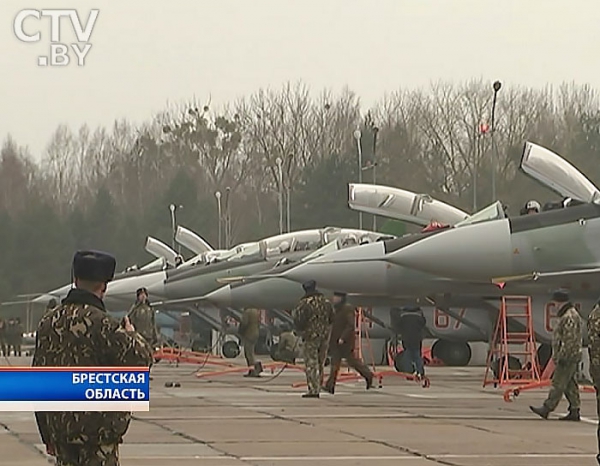Belarus’s new Russian arms: what Minsk has given in exchange

Belarusian defence minister Andrei Raukou and his Russian counterpart Sergei Shoigu. Image: belarus.by
In an interview published on 23 February, Belarusian defence minister Andrei Raukou announced the forthcoming purchases of state-of-the-art Russian weaponry.
He specifically mentioned the Su-30SM fighter aircraft and 120mm Nona-M1 heavy mortars. Earlier, on 4 February, armament director of the Belarusian armed forces Major General Ihar Latsyankou said that Minsk would purchase these systems this year.
In other words, despite its dependence on Moscow, Minsk has prevailed in its dispute with the Kremlin over defence issues. Moscow initially did not wish to provide Minsk with weapons, intending instead to replace Belarusian with Russian troops. However, it has conceded one positions after another. Minsk has thus emerged victorious in this spat.
Minsk receives arms after agreeing to a military exercise
Minsk's first attempts to procure Su-30 from Moscow date back to the late 2000s. However, a flurry of official statements over the past year indicate that the deal may be in its final stages: Moscow has decided to sell the airplanes to Minsk at a minimal price, and the parties are hashing out the deal and its specific conditions.
As for the Belarusian government, it most probably succeeded in getting the new equipment delivered more rapidly than foreseen by promising to host a joint military exercise with Russia in September. The large-scale exercise Zapad-2017 had already caused a fall-out between Belarus, its other neighbours, and the West. It only makes sense for Minsk to agree to the exercise, which has undermined its recently repaired relations with the West, if it gets something valuable in exchange from the Kremlin.
The newest military equipment – which Russia had refused to provide to Minsk before – is a logical exchange. As recently as 23 November 2016, Belarusian Air Force and air defence commander Aleh Dvihalyou had spoken about general plans to buy at least a squadron of Su-30SM fighter jets from Russia as late as 2020. Now Moscow, eager to conduct a large show of its military might in the centre of Europe, promptly agreed to give Belarus the fighter jets.
A Triple Alliance
However, the Russian government would like to minimise the costs of rearming Belarus. The Kremlin would prefer not to bear these costs at all, and for years it has refused to give Minsk sophisticated weapons such as the Su-30. As the Soviet-era fighter jets of the Belarusian air force gradually became obsolete, a growing hole emerged in the single air defence system of Belarus and Russia. Speculating on this danger, Moscow tried to stop relying on the Belarusian air force altogether. For three years, it has been putting pressure on Minsk to host the Russian air force in the country rather than rearming the Belarusian air force.
Minsk refused to increase foreign military presence in the country. Nevertheless, the problem of maintaining the joint system of air defence remained. Thus, against its will, Moscow was forced to provide Belarus new aircraft to keep the system functioning properly. Minsk, certainly, will not pay very much for the aircraft. Given its status as a critical ally of Russia, this is a logical stance. Therefore, the Kremlin has invented a scheme to simultaneously arm Minsk and reduce its own costs.
 The most likely scheme is trilateral and involves Serbia. Last year, Russia promised Serbia's Russia-friendly government six MiG-29 second-hand fighter jets and some Buk surface-to-air missile (SAM) systems. The Buk deal failed, and anyway the six airplanes from Russia would not have sufficed for Serbia to rebuild its air force, which it lost in 1999. But then, on 27 January, after returning from Minsk, Serbian Defence minister Zoran Đorđević told the Serbian daily Politika that Belarus would supply Serbia with a further eight MiG-29 and two batteries of Buk SAM systems.
The most likely scheme is trilateral and involves Serbia. Last year, Russia promised Serbia's Russia-friendly government six MiG-29 second-hand fighter jets and some Buk surface-to-air missile (SAM) systems. The Buk deal failed, and anyway the six airplanes from Russia would not have sufficed for Serbia to rebuild its air force, which it lost in 1999. But then, on 27 January, after returning from Minsk, Serbian Defence minister Zoran Đorđević told the Serbian daily Politika that Belarus would supply Serbia with a further eight MiG-29 and two batteries of Buk SAM systems.
There are good reasons to believe that Moscow demanded that Minsk help Russia's friends in Belgrade in exchange for new arms for the Belarusian army. That is, Moscow prefers to send Belgrade Belarusian equipment rather than give it its own.
The conditions of the deal between Minsk and Belgrade are very similar to those discussed between Moscow and Belgrade, emphasises Politika. In both cases, Serbia has to pay a minimal price for the hardware and finance, leaving only overhaul and modernisation. The Belarusian government would accept such a deal only if the Kremlin forced its hand or offered it compensation. Otherwise, Minsk would have no reason to be so generous. It has almost always sold its decommissioned aircraft to the customer offering the best price: the most recent example being its sale of Su-24 bombers to Sudan.
Minsk aware of risks
According to the Stockholm International Peace Research Institute, in 2012-16 the Belarusian Defence Ministry purchased arms and military equipment from Russia worth $475m. They included multi-purpose Mi-8MTV5 helicopters, Yak-130 trainer jets, and second-hand S-300PS and new Tor-M2 SAM systems. Russia remains the principal source of defence equipment for Belarus. In comparison, in the same period Minsk purchased arms worth $10m and $2m respectively from its two other major partners, Ukraine and China.
The Belarusian government strives to achieve the greatest possible independence in the defence sphere. Thus, after the personal intervention of president Lukashenka, the defence ministry stopped the negotiations on purchasing Russian BTR-82A. The Belarusian leader instead insisted upon the use of alternatives already developed by the national defence industry. As a result, in January 2017 after government tests, the Belarusian army deployed modernised BTR-70MB1.
This was not an isolated case. Armament director of Belarusian armed forces Latsyankou stated in a recent interview that a major task of national defence industries this year would be re-installing various multiple rocket launch systems on Belarusian-manufactured chassis. Until now, they had been installed on chassis manufactured mostly in Russia.
In sum, the situation of Belarusian-Russian military cooperation is more complex than the basic figures of equipment procurement or personnel training suggest. Belarus and Russia are largely interdependent.
 Belarus depends on Russia disproportionately for procuring military equipment, as it lacks money to buy from alternative sources. Russia critically depends on Belarus strategically. It needs Belarus because the latter is located in the vicinity of Russia's core region around Moscow and contributes to its security. Moreover, Belarus, as one of Moscow's few allies, helps the Kremlin keep the remnants of its imperial prestige by participating in demonstrative shows of Russian strength, despite avoiding backing Putin's adventurous moves in Ukraine, the Middle East, or the Caucasus.
Belarus depends on Russia disproportionately for procuring military equipment, as it lacks money to buy from alternative sources. Russia critically depends on Belarus strategically. It needs Belarus because the latter is located in the vicinity of Russia's core region around Moscow and contributes to its security. Moreover, Belarus, as one of Moscow's few allies, helps the Kremlin keep the remnants of its imperial prestige by participating in demonstrative shows of Russian strength, despite avoiding backing Putin's adventurous moves in Ukraine, the Middle East, or the Caucasus.
Both governments try to diminish their dependence, but Minsk has more chances of success in the long run. The situation surrounding Russian plans for an airbase in Belarus in 2013-2015 and Minsk's final success in getting modern aircraft proves it.






